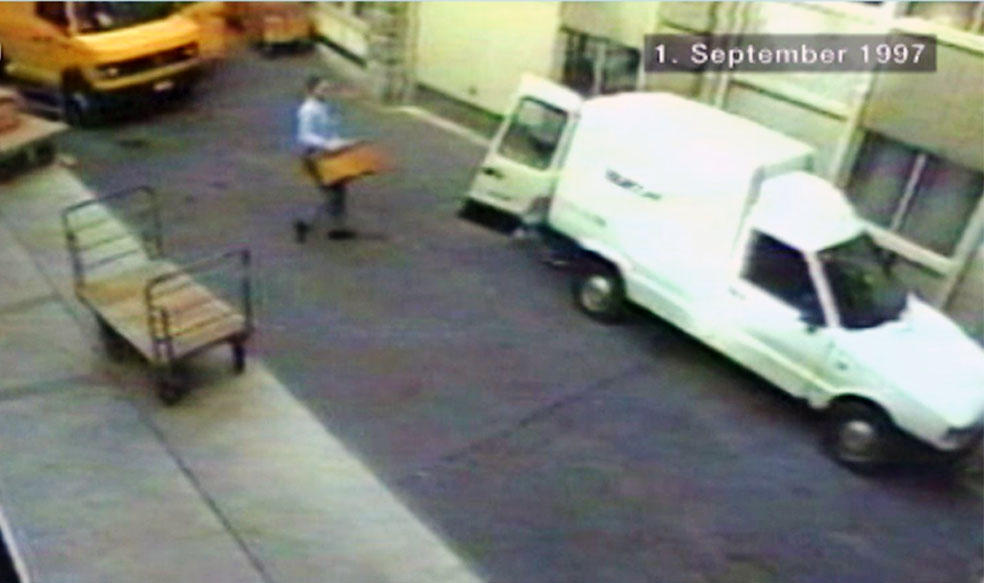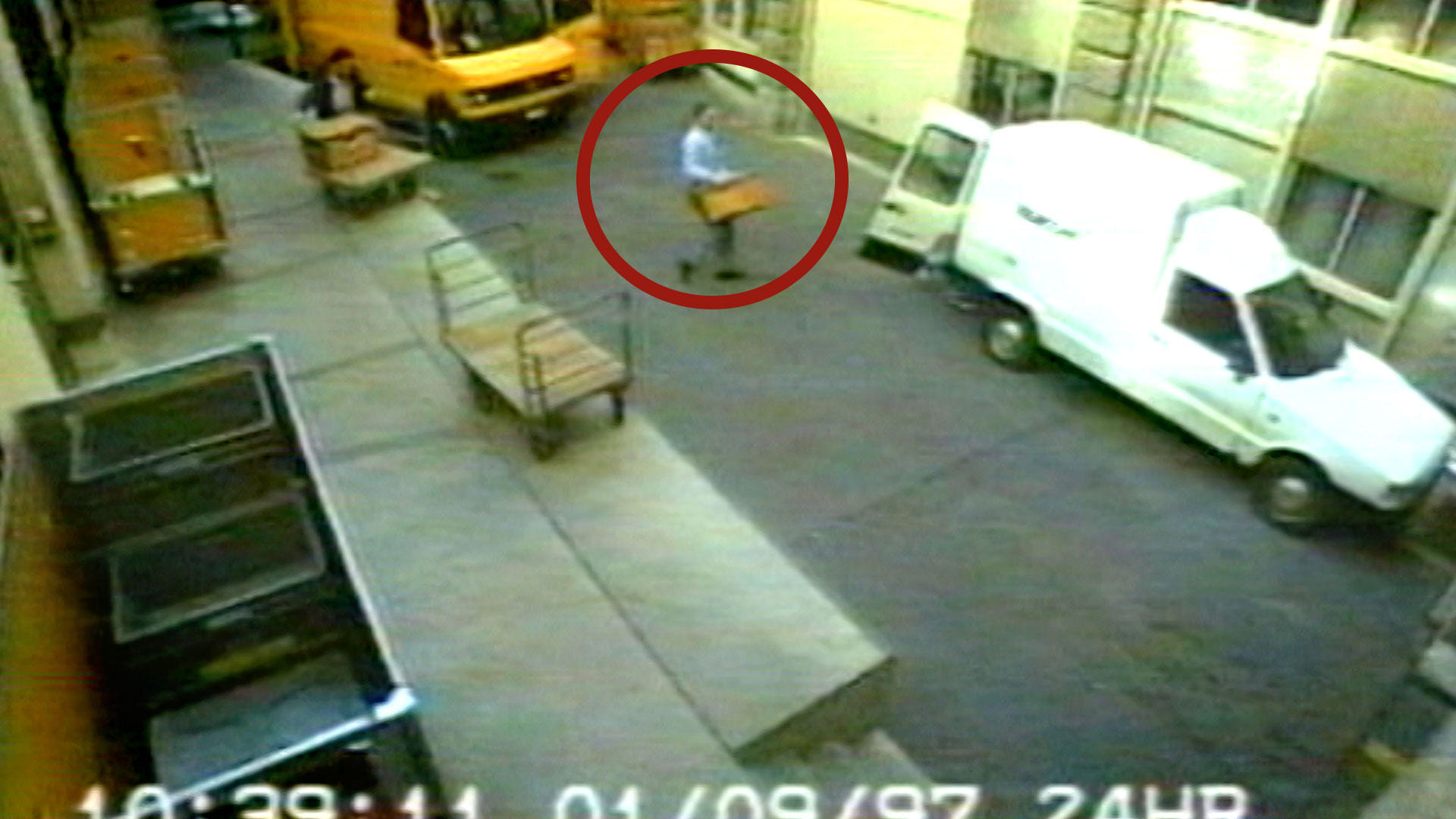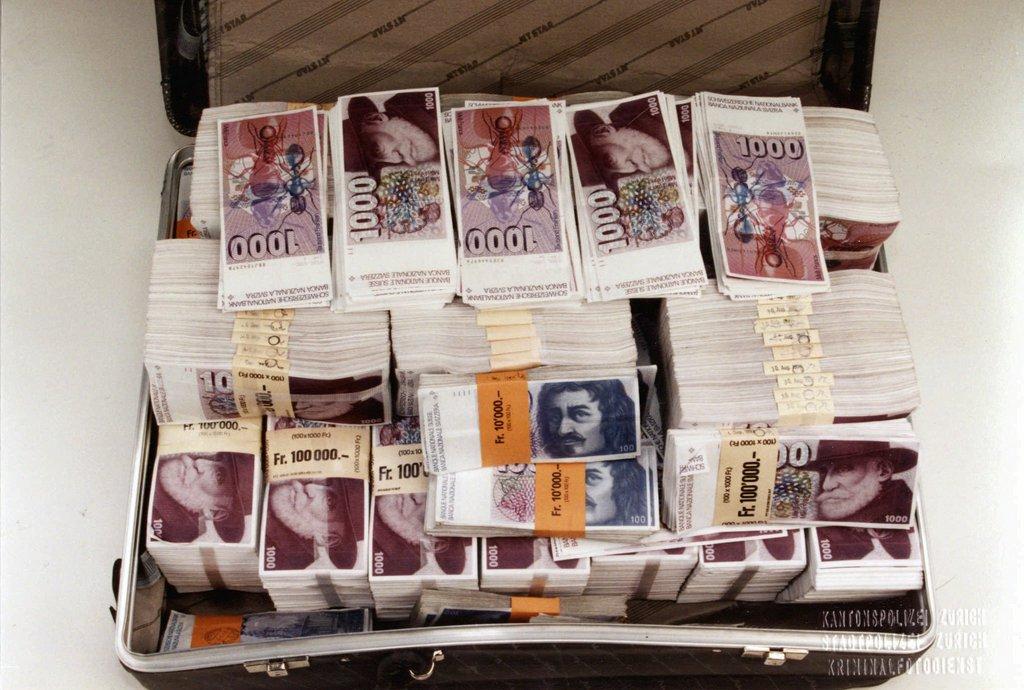The Great Swiss Post Heist of 1997

Twenty years ago, robbers made off with CHF53 million ($54.8 million) after holding up Zurich’s Fraumünster post office. The “post heist of the century” is one of the most spectacular cases in Swiss crime history and the stuff of movie scripts.
“It’s a good plan.” That’s the first sentence of the book Domenico Silano, one of the thieves, wrote about the heist. He continued, “Everything is planned, everyone knows his task. There are good chances of becoming a millionaire soon.”
The next morning, Silano and his four pals drove to the Fraumünster post office in a stolen delivery van. They disguised the vehicle as a Swiss Telecom service van with a sticker. The unsuspecting guard opened the barrier. What followed was like something out of a crime thriller: At 10:37, the robbers leaped out of the car. Brandishing handguns, they threatened employees who were loading an armoured vehicle. They heaved five chests of money into their car at lightning speed, and two more had to be left behind because there was no room in the van for them. Then the thieves raced off.

The operation lasted just a few minutes. A major investigation was launched immediately but yielded no results. The getaway vehicle and the millions in loot seemed to have vanished into thin air. It was the biggest post office theft ever, anywhere in the world. Even the legendary train robber Ronnie Biggs had to make do with less in his Royal Mail train heist of 1963 –if his haul of 2.6 million pounds is not adjusted for inflation.
Bungled investigation
The “heist of the century” made such waves that it pushed news of the tragic death of Britain’s Princess Diana in a car accident the day before off the front pages of Swiss newspapers.
“It was very brazen,” commented the judge in charge of the investigation. The police spokesman said it was believed to be an inside job. The theft was planned with military precision, but the robbers had left behind two boxes containing CHF17 million. The police asked citizens for help with leads, but warned that the criminals were armed and dangerous.
The spokesman for the PTT – the Swiss post and telecommunications company – lamented the “evil coup” at length but admitted sheepishly that the post office wasn’t insured against holdups and theft. The value of the thieves’ loot almost exactly reflected the company’s profits in the previous year.
A day later, the post’s director general conceded that the new security regulations clearly contained loopholes. The perpetrators could not be identified from CCTV footage as they had kept their backs turned to the cameras. In addition, the banknotes were used and not registered – to the thieves’ advantage.
The police investigation was also marred by bungles. For a day, investigators were looking for the wrong model car. Although the van was clearly visible on CCTV, it took too long to examine the video footage.
Journalists were unanimous: “botches, bad luck and bungles” were the order of the day.

More
How it went down
Public opinion
The public revelled in the post office’s misfortune. Customers taunted PTT tellers, saying “I’d be happy if you gave me some of the leftover CHF17 million too.” Blick newspaper ran the headline “Stupidity Must Be Punished” and published scornful texts from readers.
Public sympathy lay with the thieves. “Finally a crime everyone can understand,” wrote the Tages-Anzeiger, summing up the mood. “53 million francs, respect! That’s not just a Swiss record, but possibly also a world record. And no blood was shed. That alone elevates the five thieves into the league of gentlemen criminals.” Even Ronnie Biggs, the great train robber, expressed his “full admiration” from sunny Brazil. But, he added maliciously, he would have found a bigger car. An ingenious advertiser came up with this gem: “Dear post robbers, you could have fit CHF70 million into the Mazda E 2000.”

Ten days after the holdup, the tide began to turn. The investigators caught the suspected ringleader, three of the robbers, a number of accomplices and the post office employee who had first passed on insider tips before spilling information when he was under arrest. Eighteen people were arrested and CHF20 million were seized. The scorn first levelled at the city police gave way to congratulations for their “first-rate work”. The chief district prosecutor was dubbed “the hunter of the lost treasure” and the chief of police could now trumpet the force’s achievements in the Blick newspaper. “We had a chance at goal and we used it,” he said. Just two of the criminals were still on the loose: Hassan B. of Lebanon, and Domenico Silano, who later wrote his book about the heist. The remaining booty of CHF33 million was also still missing.

While the police continued their urgent investigation and triggered an international manhunt for Hassan B. who was on the run, Switzerland became captivated by the revelations that followed the arrests.
As background details about the heist gradually emerged, initial public admiration for the thieves gave way to derision and hostility. One perpetrator after another was caught by the police. But more than half of the stolen money was lost without a trace.
Incompetent thieves
After the police announced 14 arrests, Blick ran the headline “The post robbers were stupid!” In the following weeks, it did indeed become apparent that the post thieves and their accomplices were remarkably incompetent. The post office employee who passed on insider information was filmed by two surveillance cameras while photographing what was later to become the scene of the crime. Two thieves drank espressos by the Fraumünster post office just before the heist, and the waiter was able to hand the police the cups before they were washed, complete with DNA traces. Another dropped a photograph bearing his fingerprints at the crime scene. The thieves set fire to their getaway car right next to a fire station, so the flames were extinguished within minutes, meaning that evidence valuable to the investigators remained intact.

The men were completely out of their depth with the value of their haul and had neither a hiding place nor a plan for it. They hastily shared out the money and made themselves scarce. Silano waited for a good half-hour at a bus stop until a friend picked him up. Because he had no bag, he carried his CHF4 million in a bin liner. Another stashed CHF18 million in a friend’s wardrobe, then set off for Milan with his girlfriend, where he indulged in extended shopping sprees and paid for their CHF500-per-night suite at a swanky hotel in cash from his trouser pocket. Two thieves fled to Spain, where they drove expensive Cabriolets, gambled in casinos, bought a villa in cash and tried to pay millions into a bank account.
The fourth robber, who was still on the run, also made some grave errors. He left his fingerprints on one of the chests of money that remained at the scene of the crime. What’s more, when the Berlin police stopped his BMW Cabriolet on October 16, 1997, he was wearing a female wig with long black hair. Several ID cards found in the car bore his photograph, but all were in different names. When he was arrested, he looked “like a Native American woman,” according to the police.
International band of criminals
It was not just the thieves’ amateurism that stood out. Their international origins were also remarkable: Italian, Spanish, Serbian, Tunisian and Lebanese. Those who had Swiss citizenship were either immigrants – like the two women, who were described by the press as Italian-Swiss – or they came from bi-national families. They were the so-called little people – carers and waiters, shop assistants and car dealers – a majority of whom were foreigners in Switzerland at the end of the 20th century. Their names were Marcello, Hassan or Zoran and they lived in the suburbs, places often called “faceless” by those who don’t live in them.

The thieves from different backgrounds all came together in the Seebach district of Zurich, according to the police. So journalists descended on this world they didn’t know. The gambling arcade Il Pollicione – appropriately advertised for those with “the Midas touch” – was sealed off. Its owner was suspected as a ringleader and was taken in custody. His brother owned the bar next door.
“Eight plastic tables outside on the pavement. Inside, a bar. On either side, about a dozen tables. Dim lighting, bare décor,” was how Blick described the bar, now a magnet for reporters. Most journalists didn’t get very far with interviews.
“Silence from the Dago-Bar,” ran the Tages-Anzeiger headline. “The regular customers gave a stranger a frosty reception. A man jumped up from his chair and shouted ‘What do you want?!’” Could anyone give me any information about the arrests on Sunday in the bar and in the neighbouring gambling arcade? Twenty men maintained their silence. Their spokesman shouted out again: “I don’t understand.” Then, louder, “Get lost!” Did anyone know M.V., who had been arrested? The boss looks grimly at the room and murmurs ‘Che vuole?’ By now, other customers are standing up, and the mood in the bar is becoming threatening.”
Party’s over
The post office thief arrested in Milan was more willing to impart information. In an exclusive interview with Blick, he presented himself as the Robin Hood of the suburbs. “We used no violence. Nobody laid a finger on anyone. Nobody was killed or injured. We didn’t steal the money from the homeless or from people who had to work for it.” He said he would take part in a similar heist again any time, “but with different people”.
A good year after the post heist, the net tightened around Silano, the fifth member of the gang. He had narrowly escaped being caught after the hold-up. When Paris police identified his passport as a clumsy forgery, they deported him to Italy. Silano then fled to Miami via Venezuela, where he pretended to be the son of a hotelier who wanted to learn English. He rented a luxurious apartment and frequented expensive restaurants and clubs. But he wasn’t happy because he missed his girlfriend in Switzerland. Finally, he called her – and the Zurich police were listening in. Heavily armed cops stormed his apartment on December 3, 1998. As the Neue Zürcher Zeitung commented astutely: “He was ambushed by love”.
At about the same time, news broke that two men in Brescia who had the addresses of two of the post office robbers had been murdered. It was presumed that they had been given the task of safeguarding a part of the loot.
In autumn 1999, the five “postal thieves of the century” stood trial. None of them denied involvement in the theft, choosing instead to play the parts of naïve fools that the press had cast them in.
“It was like a game,” one of the thieves said. “None of us really thought it would work.” The owner of the Seebach gambling arcade said, “We are not professionals. Professionals would have had their airline tickets in their pockets.” Although they wielded only toy pistols and an unloaded Kalashnikov, they were handed down prison sentences of between 4.75 and 5.5 years. The youngest, who was 19 at the time of the heist, was sent to reform school indefinitely.
After the trial, the district prosecutor said there were “plenty of promising leads” in the search for the remaining loot. But the fate of the CHF27 million remains unknown to this day.

In compliance with the JTI standards
More: SWI swissinfo.ch certified by the Journalism Trust Initiative











You can find an overview of ongoing debates with our journalists here . Please join us!
If you want to start a conversation about a topic raised in this article or want to report factual errors, email us at english@swissinfo.ch.